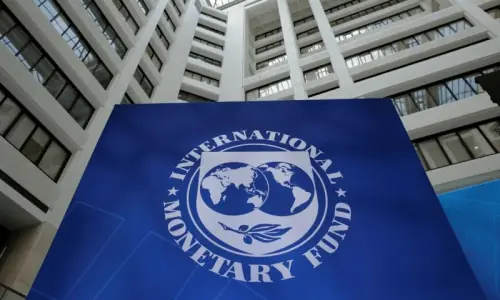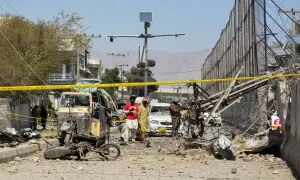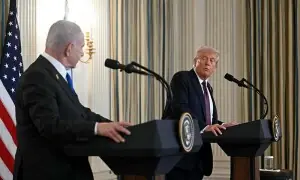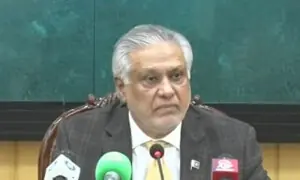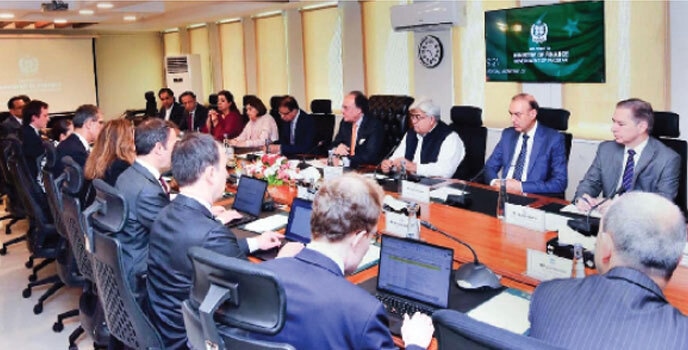
ISLAMABAD: An Inter-n-ational Monetary Fund (IMF) mission led by Iva Petrova held a formal kick-off meeting with Pakistan’s economic team, headed by Finance Minister Muha-mmad Aurangzeb, to review the implementation of the $7bn Extended Financing Facility (EFF) and the $1.1bn Resilience & Sustainability Facility (RSF).
The programme’s performance as of end-June 2025 — the period under review — has been mixed. The start of the next review period, ending December this year, has also been off the mark, particularly in revenue collection. The two sides now have to agree on corrective measures during their dialogue to meet the next biannual targets.
The opening session was attended by key economic stakeholders, including the State Bank of Pakistan governor, finance secretary and chairman of the Federal Board of Revenue (FBR).
While power sector benchmarks for the end-June 2025 period were comfortably met, revenue collection fell short by about Rs1.2 trillion — almost 1pc of GDP — in the last fiscal year, and the first two months of the current fiscal year have shown similar shortfalls.
The mission will remain in Pakistan for almost two weeks and will also hold forward-looking discussions with the authorities to push for faster implementation of the end-December 2025 targets.
Pakistan is also raising with the IMF a long-delayed implementation of the brownfield petroleum refinery policy, which has stalled about $6bn in fresh investment for refinery upgrades. Officials argue that this demand aligns with the RSF’s objectives because the upgrade would help produce petroleum products meeting European standards with minimal carbon and sulphur emissions.
The policy was announced about two years ago in consultation with the industry, which was in the process of signing binding contracts. However, under the IMF programme, the authorities committed not to grant any tax exemptions that had already been promised to refineries. As a result, although petroleum products are exempt from sales tax, the required equipment, materials and supplies are subject to sales tax and other duties without input-output adjustments, creating serious cash flow problems for the refineries.
The Petroleum Division has argued that existing refineries produce environmentally harmful by-products both during refining and consumption, posing health risks and worsening climate conditions.
Officials said that while the government has been seeking RSF funding for various projects, it has been losing out domestically due to obsolete refining technology because of what they termed a “technical misunderstanding” between the IMF, the Ministry of Finance and the FBR. “This is a simple distortion that can be addressed through reasonable dialogue,” one official said.
At the same time, while the government has asked the IMF to consider flood losses when assessing programme performance, sources said the review is based on pre-flood targets. Therefore, the authorities remain accountable for the end-June 2025 performance, although relaxations could be considered later based on verifiable estimates of flood damage.
FBR officials believe that their first-quarter revenue shortfall could be offset by higher inflation in the second quarter and improved recoveries from litigation cases that are in their final stages.
The government reportedly utilised one-third of the Rs390bn budget allocation for natural disasters and emergencies in 2025-26 to clear Rs130bn in past dues owed to commercial banks for incentives and fees paid for attracting remittances through banking channels. The authorities will now have to justify these payments from the emergency fund as they seek relaxations from the IMF over flood-related expenses. Moreover, the government has not allocated any funds in the current year’s budget for such incentives, despite estimating that about Rs100bn will be required for this purpose.
The sources said the authorities want the IMF to relax conditions for the primary budget surplus and fiscal deficit to create space for flood-related spending without imposing new taxes or cutting development expenditures.
The authorities have missed FBR revenue targets, as well as taxation targets for the retail sector and provincial cash surpluses for the end-June 2025 period, and could face a tough time during negotiations.
The government has also failed to publish the governance and corruption diagnostic report, which remains pending review and publication. As a result, the associated governance action plan is stalled. Similarly, the state-owned enterprises (SOE) governance-related law has not progressed in line with commitments made to the IMF.
Although the authorities successfully enacted agricultural income tax laws across all provinces on time, their implementation and collection — expected to begin in Sept-Oct — remain uncertain, particularly due to the ongoing floods in Punjab and Sindh. Consequently, the authorities are still unclear about the scale of required support for flood-affected populations, sectors and facilities.
On the positive side, Pakistan has met almost all quantitative performance criteria for end-June 2025. However, it is lagging behind in indicative targets and structural benchmarks, which could affect future programme implementation. Given the biannual reviews of the $7bn EFF and the $1.1bn RSF, the two sides will have to agree on past performance as well as forward-looking implementation plans.
Upon the successful completion of the review, Pakistan will be eligible for the disbursement of about $1bn (760 million Special Drawing Rights) by the end of next month.
Published in Dawn, September 30th, 2025

